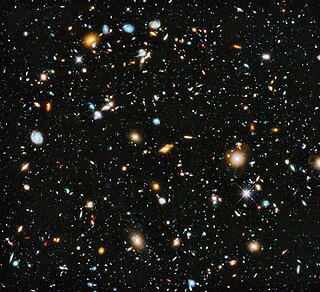The Chinese room argument holds that a digital computer executing a program cannot be shown to have a "mind", "understanding" or "consciousness", regardless of how intelligently or human-like the program may make the computer behave. The argument was first presented by philosopher John Searle in his paper, "Minds, Brains, and Programs", published in Behavioral and Brain Sciences in 1980. It has been widely discussed in the years since. The centerpiece of the argument is a thought experiment known as the Chinese room.
In physics, hidden-variable theories are held by some physicists who argue that the state of a physical system, as formulated by quantum mechanics, does not give a complete description for the system. An example would be that quantum mechanics is ultimately incomplete, and that a complete theory would provide descriptive categories to account for all observable behavior and thus avoid any indeterminism. In another version, the hidden-variables are inaccessible to us and thus in principle not detectable. The existence of indeterminacy for some measurements is a characteristic of prevalent interpretations of quantum mechanics; moreover, bounds for indeterminacy can be expressed in a quantitative form by the Heisenberg uncertainty principle.
A deterministic system is a conceptual model of the philosophical doctrine of determinism applied to a system for understanding everything that has and will occur in the system, based on the physical outcomes of causality. In a deterministic system, every action, or cause, produces a reaction, or effect, and every reaction, in turn, becomes the cause of subsequent reactions. The totality of these cascading events can theoretically show exactly how the system will exist at any moment in time.

Incompatibilism is the view that a deterministic universe is completely at odds with the notion that persons have a free will; that there is a dichotomy between determinism and free will where philosophers must choose one or the other. This view is pursued in at least three ways: libertarians deny that the universe is deterministic, the hard determinists deny that any free will exists, and pessimistic incompatibilists deny both that the universe is determined and that free will exists.
Compatibilism is the belief that free will and determinism are mutually compatible and that it is possible to believe in both without being logically inconsistent. Compatibilists believe freedom can be present or absent in situations for reasons that have nothing to do with metaphysics. They define free will as freedom to act according to one's motives.
Indeterminism is the idea that events are not caused, or not caused deterministically.

Libertarianism is one of the main philosophical positions related to the problems of free will and determinism, which are part of the larger domain of metaphysics. In particular, libertarianism, which is an incompatibilist position, argues that free will is logically incompatible with a deterministic universe and that agents have free will, and that, therefore, determinism is false. One of the first clear formulations of libertarianism is found in John Duns Scotus; in theological context metaphysical libertarianism was notably defended by Jesuit authors like Luis de Molina and Francisco Suárez against rather compatibilist Thomist Báñezianism. Other important metaphysical libertarians in the early modern period were René Descartes, George Berkeley, Immanuel Kant, and Thomas Reid. Roderick Chisholm was a prominent defender of libertarianism in the 20th century, and contemporary libertarians include Robert Kane, Peter van Inwagen and Robert Nozick.

Hard determinism is a view on free will which holds that determinism is true, and that it is incompatible with free will, and, therefore, that free will does not exist. Although hard determinism generally refers to nomological determinism, it can also be a position taken with respect to other forms of determinism that necessitate the future in its entirety. Hard determinism is contrasted with soft determinism, which is a compatibilist form of determinism, holding that free will may exist despite determinism. It is also contrasted with metaphysical libertarianism, the other major form of incompatibilism which holds that free will exists and determinism is false.
Predeterminism is the idea that all events are determined in advance. Predeterminism is the philosophy that all events of history, past, present and future, have been already decided or are already known, including human actions.
Robert Hilary Kane is an American philosopher. He is Distinguished Teaching Professor of Philosophy at the University of Texas at Austin, and is currently on phased retirement.
Artificial intelligence has close connections with philosophy because both share several concepts and these include intelligence, action, consciousness, epistemology, and even free will. Furthermore, the technology is concerned with the creation of artificial animals or artificial people so the discipline is of considerable interest to philosophers. These factors contributed to the emergence of the philosophy of artificial intelligence. Some scholars argue that the AI community's dismissal of philosophy is detrimental.
The free will theorem of John H. Conway and Simon B. Kochen states that if we have a free will in the sense that our choices are not a function of the past, then, subject to certain assumptions, so must some elementary particles. Conway and Kochen's paper was published in Foundations of Physics in 2006. In 2009 they published a stronger version of the theorem in the Notices of the AMS. Later Kochen elaborated some details.
An intuition pump is a thought experiment structured to allow the thinker to use their intuition to develop an answer to a problem.
In philosophy, moral responsibility is the status of morally deserving praise, blame, reward, or punishment for an act or omission performed or neglected in accordance with one's moral obligations. Deciding what counts as "morally obligatory" is a principal concern of ethics.
Indeterminacy, in philosophy, can refer both to common scientific and mathematical concepts of uncertainty and their implications and to another kind of indeterminacy deriving from the nature of definition or meaning. It is related to deconstructionism and to Nietzsche's criticism of the Kantian noumenon.

In quantum mechanics, superdeterminism is a hypothetical class of theories that evade Bell's theorem by virtue of being completely deterministic. It is conceivable that someone could exploit this loophole to construct a local hidden variable theory that reproduces the predictions of quantum mechanics. Superdeterminists do not recognize the existence of genuine chances or possibilities anywhere in the cosmos.

The Big Picture series provides teachers and post-16 students with up-to-date information on research findings in biology and medicine, and the social and ethical implications of this research. Published by the Wellcome Trust as a free educational resource, each issue is available for free electronically. The website provides free resources for teachers and online activities for students, including lesson ideas, animations, image galleries and short videos. As of 2016, the print subscription has been discontinued and replaced with online only.

Brief Answers to the Big Questions is a popular-science book written by physicist Stephen Hawking, and published by Hodder & Stoughton (Hardcover) and Bantam Books (Paperback) on 16 October 2018. The book examines some of the universe's greatest mysteries, and promotes the view that science is very important in helping to solve problems on planet Earth. The publisher describes the book as "a selection of [Hawking's] most profound, accessible, and timely reflections from his personal archive", and included, according to a book reviewer, drawing upon "half a million or so words" from his essays, lectures and keynote speeches. The book was incomplete at the time of the author's passing in March 2018, but was completed with “his academic colleagues, his family and the Stephen Hawking Estate”. A foreword to the book was written by Eddie Redmayne, Oscar-winning actor who portrayed Stephen Hawking in the 2014 film, The Theory of Everything; an introduction by Kip Thorne, Nobel-prize winning physicist; and an afterword by Lucy Hawking, the author's daughter. A portion of the royalties from the book are to go to the Motor Neurone Disease Association and the Stephen Hawking Foundation.
















